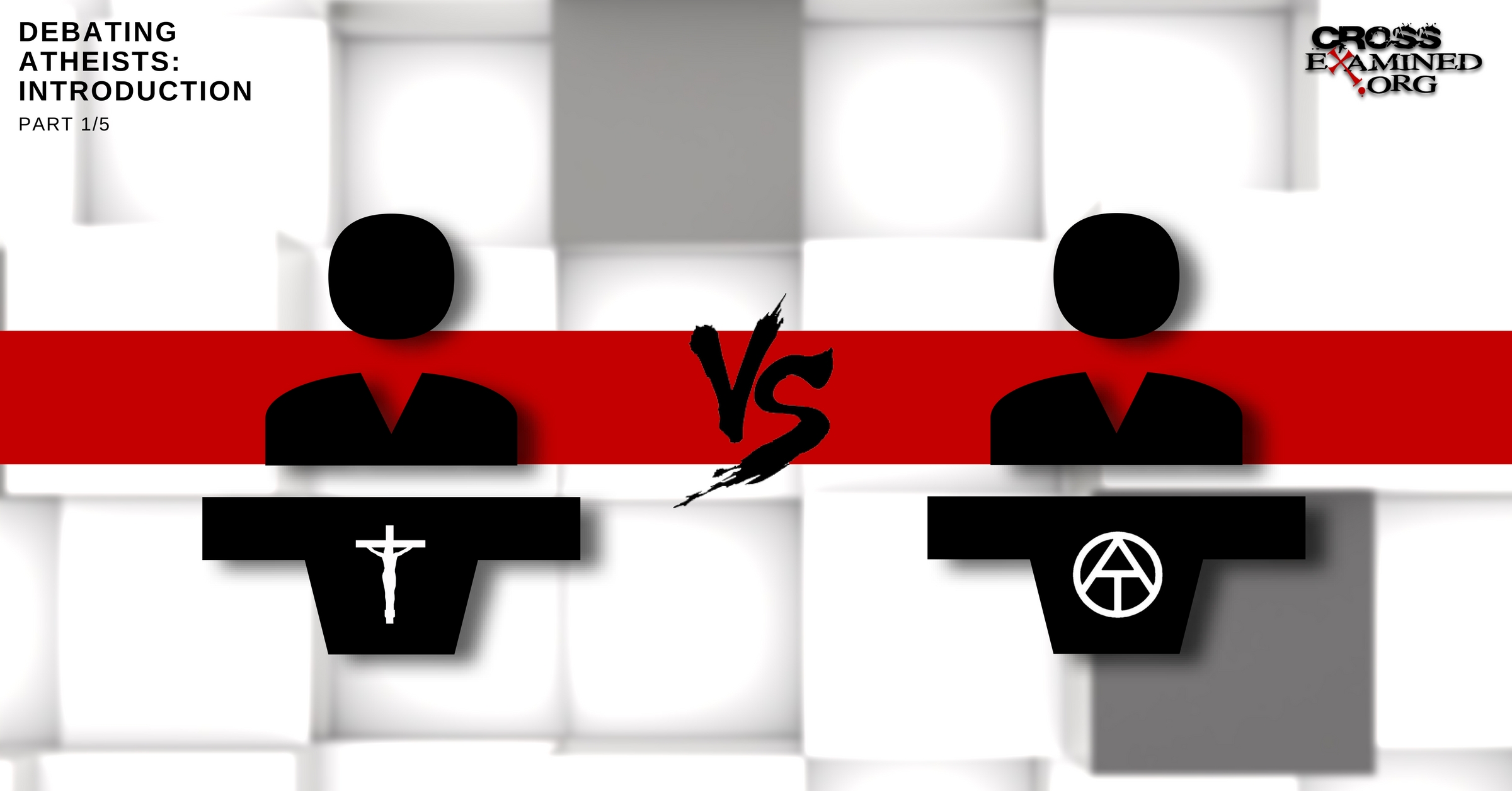By Dan Grossenbach
Understanding evil reveals an important part of reality. As much as we try to avoid it, evil is part of the universal human condition – something theists and atheists both have in common. You may be surprised, however; that the way atheists think about evil actually shows God exists.

For the previous post on part 3, atheist arguments for the Arrival of Biological Information, click here. Unlike other points in this series so far, probing evil touches the heart. It gets emotional. The argument I’m presenting, by contrast, isn’t designed to address the emotional part of the problem. There are volumes dedicated to that. Rather, the point here is to reason through three facts about evil that nearly all people agree on and to see what follows:
- Evil exists
This fact is so obvious that even the argument of evil used against God relies on it. Readers have probably heard the “problem of evil” used as a critique against theism. This was something I knew Dr. Shapiro would bring up in our debate, since he’s brought it up in a prior encounter, so I decided to hit it head on. As expected, Dr. Shapiro parroted the classic criticism from 4th century BC philosopher Epicurus: “Is God willing to prevent evil, but not able? Then he is not omnipotent. Is he able, but not willing? Then he is malevolent. Is he both able and willing? Then whence cometh evil? Is he neither able nor willing? Then why call him God?” [1]
The question puts God in a dilemma. Either he’s not all powerful (he can’t stop evil) or not all good (he’s unwilling to stop it). Theists believe God is both all-powerful and all-good thus find themselves having to eliminate one. I address this more later. What we must consider at present; however, is that the objector assumes the existence of evil prior to the objection. This is a huge assumption. Epicurus posed a fair question to the Greek polytheists of his day but is it fair to carry this over to God of the Bible? We’ll address that later. The immediate question is whether or not evil exists at all and this objection only works if it does. Put simply, if there’s a “problem” of evil, then there’s evil.
Seeing the plain consequences of this fact, skeptics typically go one of two ways: 1) ground goodness on something other than God, or 2) deny good or evil exist at all.
This first group accepts value propositions as something real (good and evil exist) but tries to avoid God. Freedom from Religion founder and president Dan Barker says “’Good’ is that which enhances life, and ‘evil’ is that which threatens it.”[2]
Sam Harris defines morality as the “right and wrong answers to the question of how to maximize human flourishing in any moment…”[3] In my debate with Dr. Shapiro, he repeated the secular humanist doctrine that value relates to the standard of universal “well-being.”
The careful reader may see that they shifted the meaning of good. Rather than goodness defined as ultimate moral perfection, they see it as the best way to accomplish a goal. Plenty could be said about this shift, but it doesn’t really matter for this part of my argument. Whether they ground goodness in human flourishing or not, they still have an objective standard. They don’t put it on God, but instead on something else of objective and universal value. Sam Harris urges, “we need some universal conception of right and wrong”[4]. So, despite this shift in definition, they find themselves in the same place in terms of establishing objective goodness. For this purpose, we can join together in agreement with atheists who agree objective goodness exists, right?
Not so fast! Other well-known atheists dismiss value altogether. In Darwinian naturalism, there is no way things are supposed to be. Dawkins puts this best:
In a universe of electrons and selfish genes, blind physical forces and genetic replication, some people are going to get hurt, other people are going to get lucky, and you won’t find any rhyme or reason in it, nor any justice. The universe that we observe has precisely the properties we should expect if there is, at bottom, no design, no purpose, no evil, no good, nothing but pitiless indifference[5].
An abstract from Cornell University scientist William Provine’s second annual Darwin Day speech starts off this way: “Naturalistic evolution has clear consequences that Charles Darwin understood perfectly” One of those consequences, he suggests, is that “no ultimate foundation for ethics exists”[6].
If moral values aren’t real, this disrupts my first premise. There are plenty of reasons to reject the idea that moral values are a convenient social construct, but it’s important to show where this takes us if it were so.
It turns out the denial of moral value just exchanges one problem for another. If the atheists who deny evil are right, then the problem of evil goes out with it. If there’s no evil, there’s nothing to complain about. Saying there’s no evil is different than living that way, however. For most people, this isn’t as far as most are willing to go. Our gut-wrenching feelings on the inside and our outward actions tell us that everyone knows evil exists. In fact, even atheists arguing this objection often find themselves blaming God for the evil they just told us doesn’t exist. While the denial of evil may be something popular writers do, those dedicated to clear thinking on this issue have come to a much different conclusion. They know objective value is only possible with God.
The philosopher who put this most poetically was one of the greatest thinkers of the 19th century who also happened to be an ardent atheist Friedrich Nietzsche. Nietzsche vividly illustrates the absurdity of a moral laden world without God in this passage from The Joyful Wisdom:
“Where is God gone?!” he called out. “I mean to tell you! We have killed him, – you and I! We are all his murderers! But how have we done it? How were we able to drink up the sea? Who gave us the sponge to wipe away the horizon? What did we do when we loosened this earth from its sun? Whither does it now move? Whither do we move? Away from all suns? Do we not dash on unceasingly? Backwards, sideways, forwards, in all directions? Is there still an above and below? Do we not stray, as through infinite nothingness? Does not empty space breathe upon us? Has it not become colder? Does not night come on continually, darker and darker? Shall we not have to light lanterns in the morning? Do we not hear the noise of the grave-diggers who are burying God? Do we not smell the divine putrefaction? – for even Gods putrefy! God is dead! God remains dead! And we have killed him![7]
In our own time, atheist philosopher of science Michael Ruse puts it this way,
“The position of the modern evolutionist . . . is that humans have an awareness of morality . . . because such an awareness is of biological worth. Morality is a biological adaptation no less than are hands and feet and teeth . . . . Considered as a rationally justifiable set of claims about an objective something, ethics is illusory. I appreciate that when somebody says ‘Love they neighbor as thyself,’ they think they are referring above and beyond themselves . . . . Nevertheless, . . . such reference is truly without foundation. Morality is just an aid to survival and reproduction, . . . and any deeper meaning is illusory . . . . [8]
The late atheist Christopher Hitchens conceded that it “could be true, yes. That could well be true,” that morality is a by product of social evolution without any objective foundation[9]. He adds, “one wants to think their love for their fellow creature means more than that.” No Christopher, they don’t merely want to think it, they actually do think it and for good reason.
Nietzsche, Ruse, Hitchens, and other like-minded atheists may not believe in God and many despise him. However, they know that without him, they’re posed with another problem worse than the first. Namely, they are unable to account for the kinds of evil that we all know is real. Worse, they deny the very evil atheists typically point to as evidence against God. This argument turns the challenge on its head. We can only make sense of evil if God exists.
In my recent debate, my secular humanist opponent didn’t seem to grasp this. Instead, he doubled down. Dr. Shapiro indicted God for allowing things he described as real examples of evil. The irony here was that he was proving my point. If Shapiro is right that there are real unjustified evils that God was allowing, he’s granting that the first premise above. It’s as if he wants to argue “God exists and he’s really bad so he can’t exist!” He can’t have it both ways. Take it from the atheists, either evil exists or we need to act like it does.
So which is it? Do moral values exist in something other than God or are they useful illusions? We’ve seen how Darwinian naturalism leads to a world without value. On the other side, we’ve seen God’s critics condemn his acts as evil in no uncertain terms. We’ve also seen that a world devoid of evil can’t condemn God for something that doesn’t exist. If true, advocates of this view don’t point us to God nor do they challenge him, essentially making evil a non-issue. Those who blame God for real evil agree with us on this first point, but how far will they go?
- Evil entails objective good
By objective good, I mean absolute moral perfection by which all things of value are measured. Evil isn’t really a thing at all. Rather, it’s the absence of something – namely, something good. Just as darkness isn’t anything on its own without light (dark = the lack of light rays), evil only comes about when something good is taken away. For Harris, Barker, and Shapiro evil is when human well being doesn’t go the way it should. Whether we base value on God or our own idea of human flourishing, evil is when something goes wrong. It’s not the way things are supposed to be. This only makes sense if there’s a right way for things to be. Next, we see what kinds of things come with objective goodness.
- Objective good must transcend, precede, hold accountable, and value humanity.
Transcending: First, goodness entails a moral authority which crosses all times, places, and cultures. People groups can’t make up their own values. Instead, value applies to all people regardless of what anyone thinks about it. That’s what philosophers mean by “mind-independent.” The Nazis can’t be just in doing what they did no matter how many people agreed with it. Instead, goodness must extend beyond the individual mind or community consensus to be the standard by which ALL people and cultures are compared. The value inherent in objective goodness must transcend humanity in this way.
Preceding: Second, goodness cannot have been invented by the first humans. After all, any values established by man can be later undone by men[10]. It would be absurd to think the first humans could come up with whatever value system they wanted because they were first on the scene. It doesn’t take much effort to see the advantage of having lying or stealing as virtues. No, that isn’t an option available to us. Goodness wasn’t invented. It was already there.
Holding Accountable: Third, there is no objective goodness if evil goes unpunished. As my friend Frank Turek puts it, where there’s no justice, there’s no injustice. When people are allowed to do bad things without any consequences, there is no justice. Objective goodness demands justice. But there’s not always justice in this world. The murderers of black teenager Emmet Till in the 1950’s rural Mississippi never faced trial. The murderer of 6 year old Adam Walsh admitted the killing but was never charged. While in his 70’s Joseph Stalin had already killed about 50 million people (not including war casualties) and continued his genocidal orders from his deathbed in a Moscow mansion. In a purely natural world with no accountability for all people, there’s no justice for all people. If there’s no justice for all people, there’s no justice at all. If that’s not good, then goodness must include universal human accountability.
Value Giving: Fourth, objective goodness must include the intrinsic value inherent in all human life. By intrinsic, I mean they all have equal worth just for being part of the species and not for any act, experience, or attribute they have or lack. It would make no sense to violate the rights of a human being if they aren’t valued in the first place. Evil and suffering experienced by humans only makes sense if the species has worth beyond itself and that their value is an objective fact of reality.
- Therefore, since evil exists, there is a transcendent, authoritative, human valuing source of objective goodness
Biblical Christianity’s explanation offers a solution that perfectly fits these facts:
- God transcendshumanity – Job 12:10, Acts 17:25, 28, Col 1:17, Heb 1:3, Eph 4:6
- God precedeshumanity – Gen 1-2, Ps 90:2, Job 36:26, Rev 1:8, Jn 8:58
- God holds humanity accountable– Gen 3:24, Amos 9:1-4, Mt 6:20, 1 Pet 4:4-5, 2 Pet 3:9, Mt 25, Mk 9:43, Rev 14:9-11, 20:10
- God valueshumanity – Gen 1:27, Ps 16:11, 73:25-26, Isa 62:5, Zep 3:17-18, Jn 3:16, Eph 5:23-32, 1 Jn 4:19
- God isobjective goodness – Gen 1:31, Ps 100:5, Lk 18:19, Rom 12:2, 1 Thes 5:18, 1 Jn 4:8
As I said in the beginning of this post, it’s hard to separate emotion from logic when reflecting seriously on evil. This was a tough one to cover. On stage during the live debate, I had three examples of human suffering in my slide show but by the third one I lost my composure and had to skip it. I know I was being overly emotional in my appeal, but my unexpected emotional response just emphasized the point. Evil exists and deep down we all know it. Christianity might not be what people like, but it provides the best explanation. Dr. Shapiro didn’t think so, but he missed the point entirely. This was most evident during the Q&A when he said “I want to clear up something really fast. Christians always say if you don’t believe in God you can’t say anything about morality. That’s nonsense!”
Nobody ever argued this and Dr. Shapiro is smart enough to know better. The point he ignored that there is no objective basis to ground moral values under atheism. I’ve had the chance to meet with Dr. Shapiro since our debate and learned he considers all morality as relative. So, even when he grants the horrid act of abusing babies as objectively wrong, he still considers it relative.
Strangely, Dr. Shapiro seems to embrace moral realism when he condemns God’s actions, or his failures to act. Shapiro can’t allow for any moral values as real and mind independent since it makes no sense under atheistic naturalism. In other words, Dr. Shapiro might argue like this: Since God doesn’t exist, there are no moral values outside of the human mind. Since there are no values outside human minds, all morality is relative.
The trouble is, I don’t think Dr. Shapiro has followed the logic as far as it goes. As Dr. Shapiro said in his opening speech “It just is what it is.” At bottom, the universe has no meaning or purpose outside of humanity, he said.
Christianity does offer it. It offers a basis for grounding value in the universe, a value of humanity and holding people accountable. Dr. Shapiro didn’t understand the point and furthered the case for Christianity every time he complained about evil. It’s ironic, actually. The very person he blamed for evil – God – is the one we can see much more clearly in contrast to the evil we all know exists. The intellectual dishonesty really showed in the inconsistent demand Shapiro and questioners put on Christianity. They tolerated, even celebrated ignorance on origins of cosmos or biology but demanded to know why God allowed evil. Even if they could ground evil in something transcendent and authoritative, why not find ignorance on that just as “refreshing?” It gets worse.
This brings us to an important rule: the one who bears the burden of proof is the one who makes the claim. It wasn’t my burden to refute my opponent’s unsupported assertions but they are his to defend. I had to provide support for my position, but so did he. No one gets a free pass here.
Dr. Shapiro is fully within his rights to criticize my ideas, but he must do more than rely on emotional reaction and make a compelling case for his view. He gave no case so there was nothing to address. That’s why I pointed out to the audience that Dr. Shapiro depended on a “shock” factor in the absence of sound argument. In addition to pointing out this fallacy, I gave three points that Dr. Shapiro needed to defend for the Epicurian dilemma mentioned at the top of this post:
- God has no moral authority to do as he sees fit with his creation.
- God has no justification to accomplish a greater good (and we have enough knowledge to determine this).
- God could have done otherwise to accomplish a better result.
Even after pointing this out during my rebuttal speech, Dr. Shapiro still failed to provide any good reasons to believe these three hidden assumptions implicit in his complaint about God. Instead of arguing it, the appeal was to the heart, “How could a good God allow this?!”
As in the other points I made, I invited Dr. Shapiro to present an alternative explanation for evil. Since he didn’t do that, the offer presented consistent with Christian theism remained the best explanation offered that day.
Theism offers the best explanation but it does more. It is so obvious that there are things wrong with this world, that the burden falls on those who deny it. Sitting on a comfy couch with my wife talking about our day is all it takes to bring this reality home. As a federal agent and a nurse, the common question “How was your day, honey?” makes this evident daily. Regardless of where you are in life, I’m sure this could be true for you too.
Christian theism not only explains evil in our world, but it’s the only one that offers a satisfying solution to it. The same God of the Bible whose perfect nature sets the standard for value also offers mercy to people who have violated it. In perfect justice, the crimes against him are paid in full by the only one who can bear it, the God-man Jesus of Nazareth. Clearly, this is something that atheists won’t grant. But you would be surprised what they do say about him. The question of Jesus will take us to the fourth and final point in this short series.
Endnotes:
[1] Classic argument for the “problem of evil” first attributed in this form to the Greek philosopher Epicurus
[2] Dan Barker, Losing Faith in Faith, page 125
[3] Sam Harris, bases his moral standard on what he deems human flourishing,https://www.samharris.org/blog/item/thinking-about-go
[4] Ibid
[5] Richard Dawkins, River Out of Eden: The Darwinian View of Life, Basic Books, 1995, p133
[6] William Provine, “Evolution: Free will and punishment and meaning in life” [abstract] from speech given at the Second Annual Darwin Day Celebration, University of Tennessee – Knoxville on Feb. 12, 1998https://web.archive.org/web/20070829083051/http://eeb.bio.utk.edu/darwin/Archives/1998ProvineAbstract.htm
[7] Friedrich Nietzsche, The Joyful Wisdom,https://archive.org/stream/completenietasch10nietuoft/completenietasch10nietuoft_djvu.txt
[8] Michael Ruse, “Evolutionary Theory and Christian Ethics,” in The Darwinian Paradigm (London: Routledge, 1989), pp. 262, 268-269.
[9] Hitchens vs. Craig debate “Does God Exist,” Biola University (La Mirada, CA), April 4, 2009, at approximately 1:25 https://www.youtube.com/watch?v=0tYm41hb48o
[10] Gregory Koukl, The Story of Reality, p73
Original Blog Source: http://bit.ly/2xAUvhp













